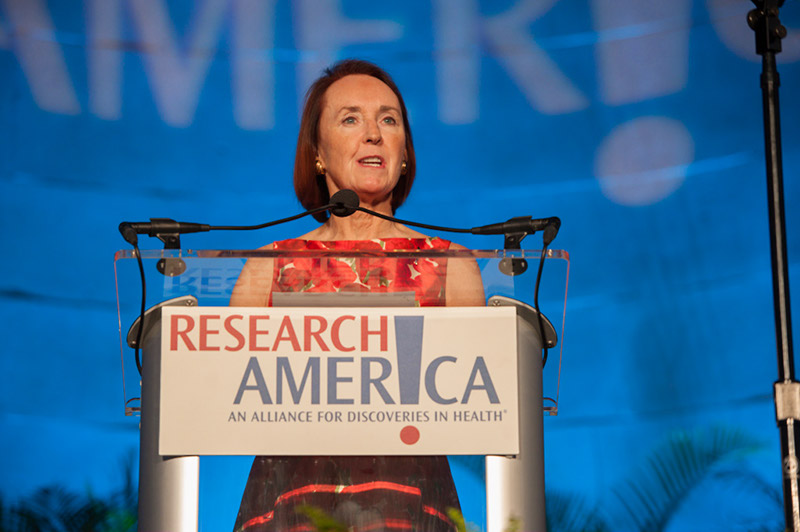Making the Most of the Moment

Dear Research Advocate,
We hosted our Annual Meeting of Members this afternoon, pausing to reflect on our work together over the last year and looking ahead. (Watch the recording.)
One meeting highlight was Sjögren’s Foundation CEO Janet Church’s powerful recounting of the challenges she and others with Sjögren’s syndrome face. She made a rock-solid case for patient engagement in research and advocacy. Another highlight was a fireside chat between our Board Vice Chair The Honorable Bart Gordon (U.S. Representative 1985-2011) and Senator Roy Blunt (R-MO), an extraordinary research champion who is retiring at the end of 2022 after 26 years in Congress.
Sen. Blunt offered this advice: “Big things will happen that you don’t expect [like COVID-19], and they’ll be consequential, and they’ll change the direction of the country or a research effort… Make the most of the moment and be willing to understand when there’s something out there you didn’t anticipate happening and see if you can also use that in a way that gets you further down the road toward a goal.”
I am so pleased to introduce new Board members Ayman El-Mohandes, MBBCh, MD, MPH, Dean of the City University of New York Graduate School of Public Health and Health Policy; Mary A. Pittman, DrPH, President and Chief Executive Officer of the Public Health Institute; and Elias Zerhouni, MD, Former Director of the National Institutes of Health (and a former Research!America board member). Learn more about our new and continuing board members.
On the Hill: Congress returns from a two-week break on Monday. That means it’s time for research advocates to step up: we encourage your organization to join (and share!) this sign–on letter urging House and Senate Appropriations leaders to provide a robust funding allocation for the FY23 Labor-HHS-Education (“Labor-H”) appropriations bill.
The President’s FY23 budget recommended only a meager 0.6% increase to the base NIH budget (read our statement). To boost funding for NIH as well as other critical research and public health agencies including CDC, AHRQ, ARPA-H, and BARDA, there must be an ample allocation for the “Labor-H” funding bill. The deadline to sign on to the letter is Friday, April 29. Email Samantha Miller with any questions.
Eyes Wide Open: When Congress returns, negotiations will resume on supplemental appropriations legislation to address critical gaps in the funding needed to address COVID-19. Our guest speaker at yesterday’s alliance discussion, American Public Health Association (APHA) Executive Director and Research!America Board Member Georges Benjamin, MD, emphasized that this funding package is not a wish list, it is an imperative. Use this editable email to make the case with your representatives in Congress.
If you missed the terrific (I’d double underscore, but you get the drift) conversation with Dr. Benjamin about the present and future of COVID-19 and how to earn and hold public trust, tune in now. Congratulations to the APHA, which celebrated its 150th anniversary this week.
Science Philanthropy Addressing Equity: In an editorial in Science, France A. Córdova, President of the Science Philanthropy Alliance and a 2022 Advocacy Award honoree, explains how new philanthropy for basic research is “taking bolder actions” with more emphasis on stimulating public-private partnerships, embracing civic engagement, and assuring equity.
Clinical Trial Diversity: On April 13, the FDA issued new, more expansive draft guidance to industry on achieving diversity in clinical trials: “Diversity Plans to Improve Enrollment of Participants from Underrepresented Racial and Ethnic Subgroups in Clinical Trials.” Comments on the draft guidance are due by June 13.
Environment and Health: Tomorrow, April 22, is Earth Day. The Department of Health and Human Services (HHS) hosted a trio of presentations for its inaugural Earth Day Speaker Series; experts discussed how climate affects not only our environment, but also health and health equity. Watch the recordings.
To learn more about how the environment and human health are interconnected, watch last week’s meeting with Rick Woychik, PhD, Director of the National Institute of Environmental Health Sciences. As I noted in last week’s letter, Dr. Woychik highlighted several initiatives including examining genes via environmental effects, a science known as exposomics.
Stay well, stay safe, and stay connected.
Mary Woolley




